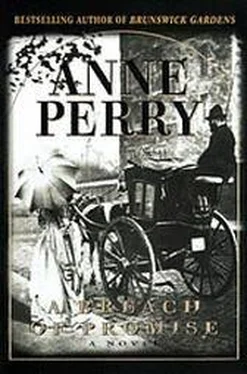What he meant was that he did not want to relive it.
"No, of course not," she agreed, standing up slowly, finding her legs shaking and her balance not very good. She put out a hand to steady herself.
"Thank you for listening to me," he said gravely. "I… I hope I haven't disturbed you too much… but there is no one else. They don't wish to know. They think it would be much better for me if I were to forget… but how can I? It would be such a betrayal… even if it were possible!" He wanted reassurance he was right. "What kind of man would I be if I could just go on as if they had never lived… and died like that?"
"One never forgets," she agreed, thinking of some of her own memories, men, and women too, who had been fragile and brave and who had died terribly. "But you can't expect other people to share what they don't understand." She straightened the bedclothes unnecessarily. "It is a part of your life, and it always will be… but it isn't all of it."
He looked at her ruefully, acknowledgment in his eyes, but he did not answer.
She glanced at his bedside table to make sure he had water and a clean glass.
"Is there anything else you would like?"
"No," he said flatly. "No, thank you. Are-are you going to sit with Perdita?"
She knew what he really meant. She was aware of his deep sense of inadequacy to be the husband, companion and protector that he had promised his wife he would be. Instead he was in need of her strength and help, not only physically but emotionally.
"Yes," she said with a smile of assurance. "As soon as I can see you are settled I shall go and find her."
He relaxed. At least for tonight he need not worry. "Thank you. Good night, Hester." Without being aware of it he had used her Christian name.
"Good night, Gabriel," she answered from the doorway, then went out and closed the door quietly.
It was after eleven o'clock, but since she had promised, she made her way downstairs to see if Perdita was still up. Most probably she was not, but she must look.
However, as soon as she opened the withdrawing room door Perdita sat up from the sofa where she had been curled half asleep. Her hair was tousled and she blinked even in the dim light of the one wall lamp still lit.
"How is he?" she asked anxiously. "Is he all right?"
Hester closed the door and walked over to the chair near Perdita and sat down. She looked at the younger woman's frightened eyes and her soft cheek, marked now where she had Iain against the crease in the cushions. She was about twenty-two, but in some ways no more than a child. She had been married at eighteen after a year's betrothal to a man who was in every way her ideal. She had seen him through the eyes of a girl who expected everything of marriage. It was not only what was required of her, it was her own dream, and Gabriel Sheldon was the perfect husband: handsome, brave, charming, well-bred and with a promising career. And for all that it had been a socially suitable marriage, they had also been in love.
Now her whole world was in ruins, for no reason she could comprehend, and she was overwhelmed by it.
"He is settled for the night," Hester answered. "I think he will sleep well." She had no idea whether he would or not, but there was no purpose in saying that to Perdita.
Perdita frowned. "Are you sure? You were in there a long time…"
"Oh… I suppose I was. We were just talking. There was nothing wrong, I promise you."
Perdita looked unhappy, twisting her hands together in her lap.
"I never know what to say to him," she murmured. "I can't keep asking how he is feeling. He only says he's all right. And I know he isn't, but there's nothing I can do." She glanced up suddenly. She had very blue eyes, but in this somber light they seemed almost black. "What do you find to say, Miss Latterly?"
Hester hesitated. She should not answer with the truth. He had not said so, but what Gabriel had told her was implicitly a confidence. It was something neither of them could share with anyone else. As close as she had been to William Monk at times;-all the causes they had fought for together, the tragedies they had seen-she would not share her experiences of the battlefield or the siege or the hospital at Scutari with him. But Gabriel understood.
She must find an answer which did not make Perdita feel even more helpless and excluded.
"It is easier for me," she began, watching Perdita's face. "We are not emotionally concerned with each other. There cannot be the same… the same sort of hurt. We were discussing places we had been to, what it was like, the things that are different, and those that are the same."
"Oh…"
Had Perdita disbelieved her? It was impossible to tell from her downcast expression and the hesitation in her voice. Her loneliness was so sharp it was almost like a cry.
"I told him a few of my experiences in the Crimea," Hester went on, impelled to add to what she had said.
"The Crimea?" Perdita did not immediately understand. Then realization flooded her face. "You were in the Crimea?"
Hester perceived instantly that she had made a mistake. Perdita had heard and read enough to know that that conflict, with its horror and its losses, had had so much in common with the Mutiny in India that Hester and Gabriel must share feelings and memories she could never know. It was clear in her eyes that she was uncertain how she felt about it. Part of her was relieved, grateful that there was someone he could turn to; another part, easily as great, felt frightened and excluded because it was not her.
"Yes." It would be absurd to deny it. "That is where I learned my nursing abilities. I imagine that is why your brother-in-law chose me to come here."
"So you could talk to Gabriel?"
"Rather more so I would have some knowledge of what his needs would be," Hester answered.
Perdita stared at the embers of the fire. "He doesn't think I can learn to do that. He doesn't think I will be any use or comfort at all."
What was there to say that was even remotely honest and yet not so hurtful it was destructive?
"Sometimes there isn't anything you can do," Hester began, thinking what more to say, feeling for words. "At times he may wish to speak of the Mutiny and of what happened at Cawn-pore, other times he will want to forget it. No one can know when each will be."
"You mean it is easier for you?" Perdita said.
"In some ways, yes, of course it is. Not just because I have seen a battlefield…"
"Can you tell me what it is like?" Perdita asked, eagerness and dread mixed in her voice. "So I can understand Gabriel? He won't tell me anything about it. I was at home when he was in India, and my father wouldn't even allow me to read about it in the newspapers. He said it was not suitable… for me or for my mother." She bit her lip. "He said we didn't have to know things like that, and anyway it was only a journalist's idea of the truth and might be inaccurate and overdramatic.
Now it's too late because the newspapers are all thrown away ages ago."
"You can always go to the library and find the back copies, if you want to," Hester pointed out. "But I am not sure it that would be a good thing. Do you wish to know about it… as much as can be understood by reading?"
The fire crackled and threw up a shower of sparks.
Perdita sat very still. "I don't know. Sometimes I think so, then there are times when I wish it never had to be thought of again and I'm glad I know nothing." She took a long breath and shook her head a little. "I just wish it would go away and everything could be as it used to… before the Mutiny. None of that mattered then." She sniffed. "I could have gone out to Delhi, or Bombay, or wherever was the nearest place to where Gabriel was. I could have been with him, and none of these things would have happened!"
Читать дальше











